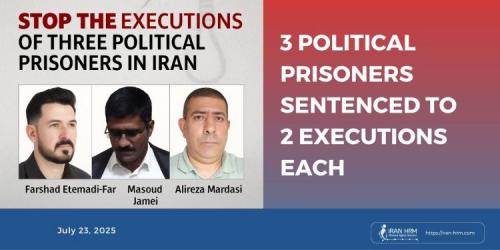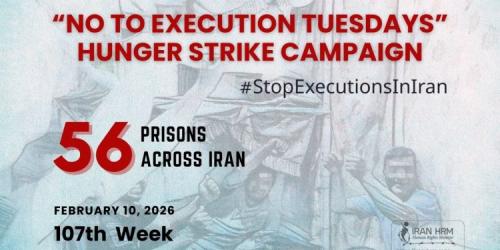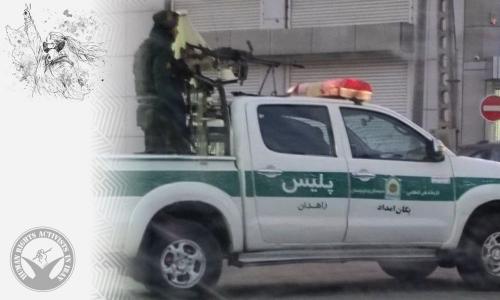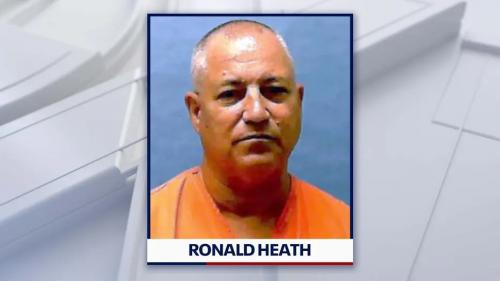26 July 2025 :
July 20, 2025 - IRAN. 3 political prisoners sentenced to death
Farshad Etemadi-Far, Masoud Jamei, Alireza Mardasi
Amid an unprecedented wave of repression against political dissent, on July 20, 2025, the theocracy in Iran sentenced 3 political prisoners - Farshad Etemadi-Far, Masoud Jamei, and Alireza Mardasi - to 2 executions each and one year of imprisonment. These brutal verdicts come at a time when dozens of political and ideological prisoners in Iran have recently been sentenced to death or executed. International observers consider this escalation a clear reflection of the theocracy’s growing fear of popular uprisings and its desperate attempt to prevent another nationwide revolt.
The case of these three prisoners; marked by torture, forced confessions, medical deprivation, and legal ambiguity; is part of the governement’s broader strategy to physically eliminate organized opposition. Human rights experts warn that the charges, especially the alleged affiliation with the People’s Mojahedin Organization of Iran (PMOI), coupled with the nature of the sentences, strongly resemble the official rhetoric and judicial pattern that led to the 1988 massacre.
The three political prisoners; Farshad Etemadi-Far (a researcher from Kohgiluyeh and Boyer-Ahmad province), Masoud Jamei (an Arab Iranian and former National Iranian Oil Company employee), and Alireza Mardasi (a well-known elementary school teacher from Ahvaz); were each sentenced by Branch 1 of the Revolutionary Court of Ahvaz, presided over by Judge Adibi-Mehr, to two executions and one year of imprisonment.
They were tried alongside Saman and Davood Hormat-Nejad, who received 12 and 15 years of prison respectively. All 5 are part of a joint case.
On June 16, 2023, Iranian security forces arrested Etemadi-Far and the Hormat-Nejad brothers in the village of Pichab, Kohgiluyeh and Boyer-Ahmad, and transferred them to the Intelligence Ministry’s detention center in Yasuj. In August, Masoud Jamei and Alireza Mardasi were also arrested in Ahvaz and added to the same case. From the outset, the detainees were charged with “Moharebeh” (waging war against God), “corruption on Earth,” “membership in the PMOI,” “propaganda against the regime,” and “collusion against national security.”
According to verified testimonies, the detainees were held for months in IRGC Intelligence detention centers and later transferred to Sheiban Prison in Ahvaz, where they were interrogated under severe torture, denied access to legal counsel, and forced to give confessions under duress. These coerced statements were used as primary evidence to issue the death sentences.
Sheiban Prison, where these prisoners are held, is notorious for inhumane and degrading conditions. In Ward 5 alone, over 70 political prisoners are kept in overcrowded cells without proper ventilation, clean drinking water, or access to medical treatment.
Farshad Etemadi-Far suffers from severe gastrointestinal and respiratory issues. His family has delivered essential medication to the prison, but authorities have refused to hand them over.
Masoud Jamei is battling stomach cancer, high blood pressure, and internal infections. In July 2025, after protesting his conditions, he was forcibly disappeared and transferred to an unknown location.
Alireza Mardasi suffers from respiratory allergies and has been denied any specialist treatment for nearly a year.
Reliable sources confirm that prison officials are deliberately obstructing medical care and transfer to external hospitals, effectively implementing a policy of slow death for political detainees.
This case exemplifies the systematic and institutionalized violations of fundamental human rights:
Articles 5, 9, and 10 of the Universal Declaration of Human Rights (UDHR) regarding prohibition of torture, arbitrary arrest, and the right to a fair trial have all been violated.
Articles 6, 7, and 14 of the International Covenant on Civil and Political Rights (ICCPR), guaranteeing the right to life, protection against torture, and access to due process, have also been breached.
The accusation of mere affiliation with the PMOI, without evidence of any violent act, and the issuance of double death sentences based on coerced confessions, mirrors the judicial logic used during the 1988 massacre of over 30,000 political prisoners. As UN human rights experts have warned, the judiciary’s return to such rhetoric signals the alarming possibility of renewed mass executions.
The implications of these sentences extend far beyond the individuals directly involved:
Masoud Jamei’s wife and three daughters are also being tried in a separate case in connection with the PMOI. This constitutes collective punishment, a violation of the principle of individual criminal responsibility.
Alireza Mardasi, a beloved educator, has been removed from his classroom and denied the right to continue serving his community.
Families have been kept in the dark, barred from contact, and subjected to long-term psychological stress; amounting to state-sponsored psychological torture.
The double execution sentences handed down to Farshad Etemadi-Far, Masoud Jamei, and Alireza Mardasi, all political prisoners and supporters of the PMOI, represent a deliberate strategy of political elimination through the judicial system. These acts constitute extrajudicial killings and grave breaches of international law.
We urge the following international bodies:
The United Nations Human Rights Council;
The UN High Commissioner for Human Rights;
The UN Special Rapporteur on the situation of human rights in Iran;
The European Union and its Member States;
To take immediate action, including:
The suspension of these death sentences, independent investigations into the judicial process, release of all political prisoners, and referral of those responsible for human rights violations to international accountability mechanisms.
Each day of inaction puts more innocent lives at risk.
https://iran-hrm.com/2025/07/23/three-political-prisoners-sentenced-to-two-executions-each-in-iran/











